Yesterday, we spent the day with my son and daughter-in-law, hung out, watched some TV, ordered pizza and talked a lot. As you can guess, the conversation headed in the direction of our new president, Donald Trump and the executive orders that he has signed during his first week in office. We talked about how the country and the world is in an uproar and what our opinions were.
I truly enjoy these conversations, because in our family, we try to ask questions and not just shout our point of view out. Now, I’m not saying that it didn’t get heated at times, because people tend to get passionate about certain things they feel are universal truths.
I did notice that everyone was repeating several things they saw in the news or on social media, which were big generalizations about one party or another. This bugs me because it keeps us from digging into the actual subject matter and forming a real educated opinion about it.
While everyone keeps posting memes that basically point out how the “other side” is wrong , I have yet to see someone ask a genuine question. It’s as if everyone I know suddenly has a triple PHD in politics and life in general.
I have yet to see someone ask a genuine question. It's as if everyone I know suddenly has a triple PHD in politics and life in general. Share on X
When did we stop asking questions?
I get that it’s a very volatile and interesting time in our nation’s modern history, and it does bring about a ton of emotionally charged proclamations. I say proclamations, because I don’t really see discourse. Even when I watch the news I just see a bunch of talking heads speaking at each other instead of with each other.
I, for one, won’t be afraid to say that I am always on a quest for knowledge, for information, to learn and form better opinions on the world around me. That doesn’t mean that I do not stand for certain things, it just means that I am open to dialogue.
For example, my husband and son both served in the Navy. My son was a combat medic in the war in Afghanistan. My daughter-in-law is currently serving in the Air Force. We all have these life experiences that inform us about the world we live in. So I ask them a lot about the military, how things work and what they think about certain things. Their input gives me information that I just wouldn’t have otherwise, no matter how much I read about it.
Likewise, being a mother who didn’t sleep a wink during the time my son was away at war and being a Cuban exile whose father was a political prisoner gives me a viewpoint that my children could never understand. So they ask me a lot of questions about why I see things the way I do.
What is an executive order anyway?
One of the things I wanted to look into is the actual definition of an executive order. Now, I’m not going to talk about what I think about the latest ones, because this post isn’t about what I think and how you should think the same way. My goal is to get us to ask more questions, to think more, to be open to understanding and to stop proclaiming as if we were Aristotle incarnate.
Here is the clearest explanation of an executive order I found on ThisNation.com
Executive Orders (EOs) are legally binding orders given by the President, acting as the head of the Executive Branch, to Federal Administrative Agencies. Executive Orders are generally used to direct federal agencies and officials in their execution of congressionally established laws or policies. However, in many instances they have been used to guide agencies in directions contrary to congressional intent.
Not all EOs are created equal. Proclamations, for example, are a special type of executive order that are generally ceremonial or symbolic, such as when the President declares National Take Your Child To Work Day. Another subset of executive orders are those concerned with national security or defense issues. These have generally been known as National Security Directives. Under the Clinton Administration, they have been termed “Presidential Decision Directives.”
Executive Orders do not require Congressional approval to take effect but they have the same legal weight as laws passed by Congress. The President’s source of authority to issue Executive Orders can be found in the Article II, Section 1 of the Constitution which grants to the President the “executive Power.” Section 3 of Article II further directs the President to “take Care that the Laws be faithfully executed.” To implement or execute the laws of the land, Presidents give direction and guidance to Executive Branch agencies and departments, often in the form of Executive Orders.
Read more about executive orders and their history here.
One more thing to note is that an Executive Order is still subject to judicial review. This means that it can be struck down if deemed by the courts to be unsupported by statute or the Constitution.
History of Executive Orders
Another question that I had was, “How many executive orders has each president executed?” I wasn’t sure whether Trump is being trigger happy or if this was just business as usual for a newly elected president. So, again I researched it. Here is a handy graphic that shows the number of executive orders signed by each president since Franklin D. Roosevelt.
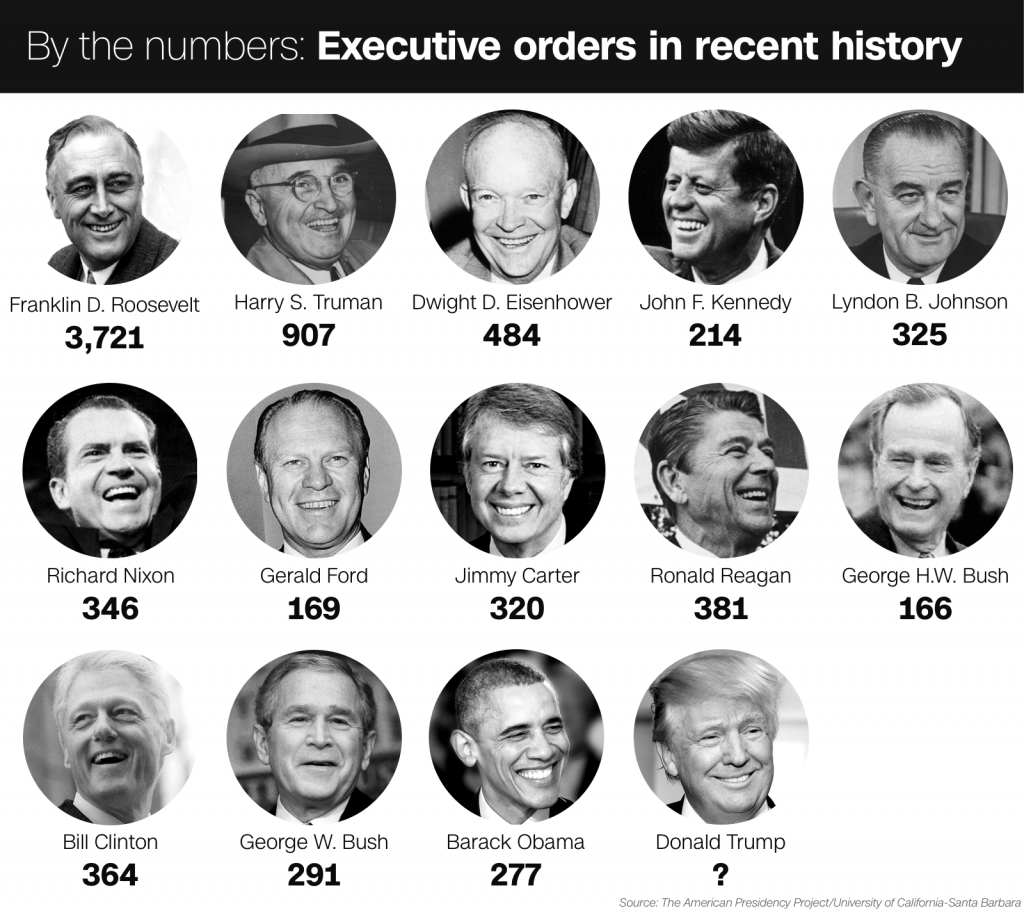
Asking Questions Doesn’t Take Away Who You Are
Asking questions about things that are happening politically right now does not mean that you are turning your back on who you are, your political party or your family.
I am a Cuban American who emigrated with my parents as a little girl. My childhood was colored with hundreds of stories from friends and family of the injustices that were experienced as a result of the Cuban Revolution. Therefore, I have a very strong aversion to the idea of Communism and leaders who have, in my view, destroyed their nations with it. That doesn’t mean I don’t think some Socialist principles are necessary, because I also hold a firm belief that we need to care for our weak and desolate and that there need to be checks and balances. It just means that I believe strongly in free enterprise and freedom of speech, religion, etc. Things that we generally take for granted although we unknowingly exercise them daily.
None of these things means that I can’t seek to understand opposite viewpoints.
So my question to you is, do you feel that you have a perfect handle on everything going on politically right now? If you don’t, is there a specific question you aren’t sure about?
Maybe if we start to ask more and stop proclaiming, there will actually be some dialogue.

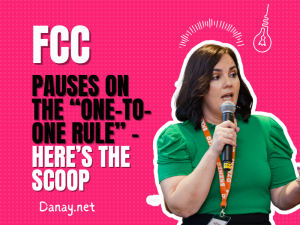
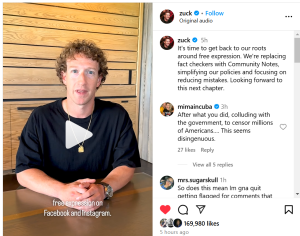
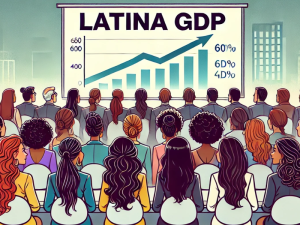
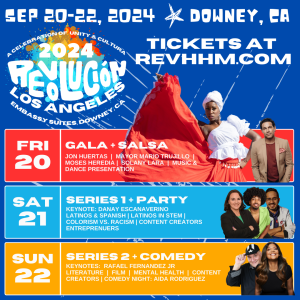
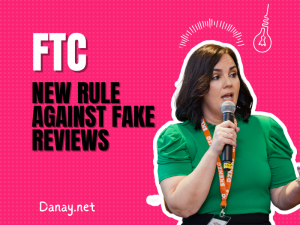
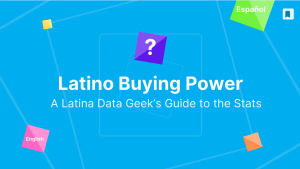
 Noticias Newswire
Noticias Newswire 


42 Responses
I definitely have a lot of questions. Just like everyone else!
I LOVE that you were so perfectly diplomatic here. It’s unclear exactly what your views are, and I like knowing that that was your point. It’s true that we’re all so often caught up in “proving” how right our side of the argument is, that we forget all about having an honest discussion where everyone has a chance to truly be heard. I’m sharing this.
Thank you Brandi, you totally got my intent and I love that!
This is an awesome post!! I definitely agree with what you say!! Its ok politicals don’t know it all 🙂
I absolutely agree. Today we must be really careful about everything that we read and hear in media. They are not neutral I’m afraid. And of course, I’ve got lots of questions, but I always try to find the answers in different sources and points of view.
Great post! This days, everyone need to read this kind of post. Couldn’t agree more with all you wrote!
I think we all have a lot of questions! We should all have the right to ask them and have an honest debate about them.
I so agree!
I have a friend who loves to debate and will post political things just to start conversations. Asking questions is always good.
Hah, we all have those friends. I have several, and while I know many do mean well, a lot of folks are not realizing it falls on deaf ears unless you ask people what THEY may think as well.
There is so much misinformation out there and people need to check their facts. I totally agree with this.
This is such a good post. I’m glad that you’re encouraging people to ask questions. Truth be told, I was embarrassed the first time I had to research what an executive order was, and I had no idea the history until now. Thanks for sharing!
xo, Helene
I love this post because it has just highlighted how people love to conform and they try to pass a view and an opinion so strong as if it were their own, and yet its influences from social media or their neighbours. we forget to stop and ask questions, and try to understand what it is we are supporting, all we are interested in is pointing a finger and shouting and screaming out all the wrongs in the other person at the top of our voices. Anyways, Politicians are just humans like us. Thanks for bringing this to our attention.
This is a nice post and perfect for me, We all have a question in our mind but like me sometimes I’m afraid or being shy to ask. This is a great encouragement to ask questions.
Fantastic post. I personally am so tired of all the political talk, but I liked how mentioned doing your own research and checking facts.
I wish the politicians would ask more questions instead of throwing out proclamations and bad-mouthing each other! But maybe the general public can set a good example for them by starting to ask more questions ourselves.
While it’s important to know what’s happening with our government I couldn’t agree more with what you said. This was super objective and I wish there were more posts like these
Yes! I hate the people who think they HAVE to be right. It drives me insane. I see it a lot on social media.
We all have the right to know everything. A government should be transparent in everything they do, it is a must. They serve the country and was obliged to let the countrymen know about everything that was going on to the country and where did our taxes go.
Politics is a topic that I always find a reliable someone to discuss it to me as that is the topic that I have no interest to absorb, that’s why it is a good thing to have friends in law firms to guide us.
It really is crazy how much people just take other words on things! Great information, so important to do your own research before talking.
I agree! Asking questions and listening is very important. People are believing whatever we see in the news and not analyzing what’s really happening..
I agree, this is why there is too much false news these days. People have stopped researching and rely so much on memes and news that they hear or read about. It’s good to do your own research especially since it’s a matter that concerns you.
I like that you researched and checked facts before sharing. Nowadays there is so much misinformation out there that what you hear or read might not be the same as what your neighbour has heard. Asking questions is always a great idea.
I’m not an American and don’t profess to know an awful lot about American Politics but at this point I think the whole world is involved in Trump’s decisions. I’m definitely going to educate myself further on what it all means!
Great post. I try to just stay away from discussing politics on a public platform. So many different opinions.
This is great information. I never truly knew what the extent of an executive order entailed. I appreciate you posting this. It gives new insight.
Just because it’s online or it’s on TV doesn’t mean that it’s true. It’s better to do your own research when it comes to what’s happening in the world and in our country.
I don’t think anyone has a perfect handle on what is going on around us, politically, as there are so many lies and misinformation spread starting at the highest power. Who knows what the truth is?!
I try to stay out of politics on any social media because a lot of people do not know what they are talking about. If your opinion is not what someone wants to hear, you are put down. Its all a mess.
Now is a better time than ever to ask questions. The more we ask, the more we learn. And while I stay out of politics on social media, it’s still something we discuss occasionally at home. I still see the memes and bashing that’s going on and don’t agree with it at all. We’re all people and we all have opinions and if you’re opinions are different from mine, it doesn’t make you any less of person. And by asking questions we can learn why each other has those opinions.
It’s always healthy to ask questions, and it’s more important to search for answers. In the political speaking, wandering the why’s of the how’s.
I find that Trump is doing too much the little time he’s in the White House. He need to slow down and take it a day at a time to ensure that everything works accordingly. We cannot live without asking questions; that is how we learn.
I think every person have his own ideas and opinions , and we should respect each other to build a free respectful society, thanks for sharing
This really resonated with me because I agree generalisations repeated via the media are the present day plague!! Without questioning – no opinions are actually valid, rather they are imitated. We must keep challenging!
Great post!!!!! I honestly spent a lot of time googling things the past few weeks because I just like you wanted to know the truth. Is the media hyping things up or what? I was shocked to see that the media is definitely building things up -_- lesson I learned was get my news from multiple places to avoid one sided stories
I do not have a perfect handle on politics and anything else but I agree your approach to always keep our mind open and listen to other person’s stories instead of just saying our opinions and think they are correct. And it is always good to do our homework and find a reliable source to back up the facts.
I know, politics are getting crazier even in my own country and the least I can do is to pray for peace and for a better world.
I’m not a know it all, but I did major in poli sci. This also irritates me. My family is a political minded family who votes on both sides of the aisle except this last election.
Great explanation of EO, and yes we should all asks questions and clarify what is going on and most important ask the right person the question so there is no misunderstanding of the meaning.
so love this post, had no idea about these stats! thanks for sharing!
Very interesting. Nowadays, political discussion is especially heated since the new administration seems keen on altering USA relations with every other country, and like you say, most people simply repeat what they’ve heard in the news or seen on social media. Asking questions is essential to having proper dialogue.